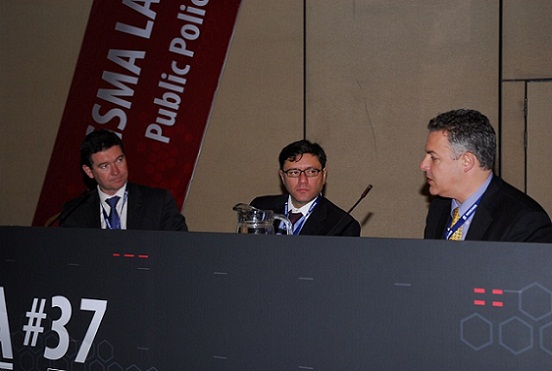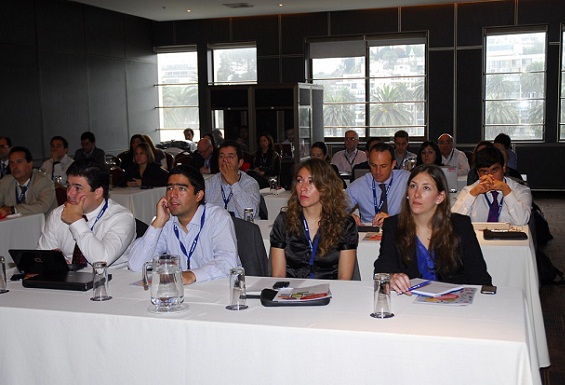The seminar “Development of the mobile broad band – Now and in the future” opened the 37th Plenary Meeting of GSMA Latin America, outstanding the importance that means the Access to Mobile Internet to close definitely the digital divide among the region, which exceeds the 630 millions of connections.
The first speaker of the conference, John Giusti, the Head of Spectrum for the GSMA, reasserted the stance that is a central part of the work into the Association, in favor of harmonize the bands used for mobile broadband services, because it helps to reduce the devices costs until a 50% for the consumers and, at the same time, facilitates the networks deployment. “The growth deploying fixed infrastructure is limited, that is why the Mobile Broad Band will be crucial for the universalization of services, becoming the main platform for high-speed internet services for most of the Latin-Americans who are currently disconnected”, he explained.

Later, The Director of GSMA Latin America, Sebastian Cabello, described some of the results of the Latin America Mobile Observatory: “The mobile market in the region generates about 175 billion or 3.6% of the regional GDP. The distribution of the spectrum of Mobile Broad Band, in the short term, will help to improve even more the coverage and connect to the “disconnected”, it will speed up the adoption rates and it will shock significantly the economic growth.”
For his part, Edwin Fernando Rojas, Leader of the ECLAC Secretary for the Regional Dialogue of Mobile Broadband, highlighted the need of decreasing the impact of the international traffic costs regarding the broadband tariffs to promote the creation and adoption of local content and increase the regional traffic exchange.
At the seminar, also presented Sergio Scarabino, Director of the ITU Office for South America, who said it was necessary to make additional assignments of the spectrum for mobile services and identify additional broadband frequencies. Alexis Milo Caraza, Commissioner of the Federal Commission of Telecommunications of Mexico (COFETEL): pointed out the opportunity that means the digital switchover to take advantage of the release of the 700 MHz band.
Representing the Chilean Government, Oliver Flögel, Executive Secretary for Digital Development, explained the different initiatives that they have in mind to contribute to the digital development and inclusion in the short term: Infrastructure Development, devices provision, massification and subsidization for the demand and the development of applications for productivity. “The total penetration of Internet (fixed + mobile) in Chile reaches a 29%, mainly driven by the mobile internet connections which have increased an 886% since June 2009”, he emphasized.

During the first day of the Regional Conference, also presented Dr. Jack Rowley, expert on Health’s matters for GSMA, proving the lack of evidence of the negative effects on the exposure to electromagnetic fields of mobile phone base stations: “taking into account the low levels of exposure and the results of researches until now, there is no scientific evidence that the weak signs of radio frequency and wireless networks cause negative effects on health”. Among other specialists on the effects of the non-ionizing radiations, were Renato Sabatini, biomedical of the Brazilian institute Edume, and Aderbal Bonturi from the Mobile Manufacture Forum, who supported some of the concerns presented by the Director of ATELMO, Guillermo Pickering, regarding the Antennas Law that the Chilean Congress is about to enact.
About the GSMA LA Plenary Meeting #37
The 37th plenary meeting of GSMA Latin America was conducted between 23 and 25 April in Vina del Mar, Chile. Sponsored by ATELMO (Chilean Association of mobile phones) composed of the local operatos Claro, Entel, Movistar, Nextel and VTR, consisted of 3 days of activities including Mobile Business and Public Policy seminars and the sessions of the four GSMA La Working Groups: Billing and Roaming (BARG), Regulatory (REGF), Technical and Terminals (TECT) and Security and Fraud (SEGF). The event had more than 450 representatives from 40 mobile operators in the region, 37 companies providers of networks and services, and more than 30 representatives of government among those who stood out Subtel and CORFO (Chile), Cofetel (Mexico ), ACMA (Australia) and PTS (Sweden).
Pictures: Photo gallery from the Public Policy Seminars